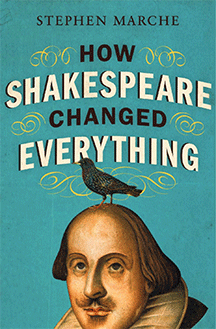By David Partenheimer
Stephen Marche’s How Shakespeare Changed Everything is an audacious title, which invites comparison with a placard announcing the “Greatest Show on Earth” at Barnum and Bailey Circus. To continue the simile, the book is a nine-ring circus about Shakespeare’s impact on our society: 1) the rise of Paul Robeson in the role of Othello and his contribution to the African-American Civil Rights Movement; 2) Shakespeare’s neologisms and some burlesques of his works; 3) how Freud is indebted to Shakespeare for his ideas about psychoanalysis, especially the his concept of the Oedipus complex; 4) how Shakespeare corrupted the youth, particularly those like Romeo and Juliet; 5) Shakespeare’s role in the assassination of Lincoln; 6) Shakespeare’s complicity in the starling infestation in North America; 7) Shakespeare as a propaganda tool for the Nazis and Communists; 8) how the Wild West loved Shakespeare, but Tolstoy hated him; and 9) why fools and phonies don’t think Shakespeare wrote his own works. Marche is the elegant master of ceremonies, who presents each of these exciting performances and chats on the side with the reader about his own thoughts. He is a liberal arts scholar, a professor of literature, a fiction writer, and a regular contributor to Esquire. His various talents all come into play in his entertaining yet scholarly anecdotes.
As a circus simile, Cirque de Soleil does Marche’s book more justice because its performances are artistic, sophisticated, and often with a plot. In How Shakespeare Changed Everything, the plot is about the ghost of Shakespeare, who wanders through the centuries spreading his 1,700 neologisms, promoting racial justice, inciting a sexual revolution, establishing the cult of youth, providing a literary model for the assassination of Lincoln, and releasing a plague of starlings. As the title would have us believe, Shakespeare’s ghost is real and changed everything in our society with his handy tool of fate.
Marche’s brand of commentary may well keep Shakespeare (and other writers) popular. Marche speaks in the idiom of our time with a minimum of scholarly jargon. He elegantly weaves his sources cited in a notes section into an accessible narrative. Few people will read such Shakespearean critics as Bradley, Bloom, or Frye unless assigned in the classroom. Marche’s book is for readers who may have read a few plays or viewed a few performances of Shakespeare, but never understood why Shakespeare is supposedly so great. Here Marche steps up and shows how Shakespeare is both important as a cultural icon and present in our lives in ways we wouldn’t have noticed without his book. Marche makes Shakespeare a celebrity, star, or even superhero. It is to Marche’s credit that he credits Shakespeare with impacting culture as an individual rather than as a social product. One should read Bloom’s Shakespeare: The Invention of the Human for a more profound work from the same perspective.
Members of Phi Beta Kappa should read How Shakespeare Changed Everything in order to see the state of popular literary studies in Shakespeare.
David Partenheimer (ΦBK, University of Utah, 1971) is a professor of English at Truman State University and a resident member of the Delta of Missouri chapter of Phi Beta Kappa.




